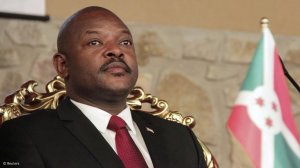May 20, 2015.
For Creamer Media in Johannesburg, I’m Anine Vermeulen.
Making headlines :
South African public sector unions secure wage deal, averting strike action.
Burundi’s president Pierre Nkurunziza delays parliamentary elections by one week.
And, African National Congress stalwart Matthews Phosa says policy instability makes investors wary.
South Africa's government sealed an agreement with unions on Tuesday to raise public sector wages by 7% this year, the head of the bargaining council said, averting a potentially crippling strike by 1.3-million workers.
Public sector unions had initially sought a 15% increase before lowering their demands to 10% during lengthy negotiations since September. Workers, including teachers, nurses and policemen, would also get better housing and medical aid allowances under a three-year deal.
General secretary of the Public Service Coordinating Bargaining Council, Frikkie de Bruin said the talks have been tough but this was the best deal they could get.
The talks had to be referred to independent mediators in March because there was no breakthrough.
Under the deal the government agreed to increase wages this year by projected consumer price inflation, which the Treasury forecasts at 4.8%, plus 2.2%.
However, in 2016 and 2017 salaries would rise in line with average inflation plus 1%.
The government has also agreed to increase medical aid cover by 28.5% per worker and increase a housing allowance to R1 200 a month, from R900.
Burundi's President Pierre Nkurunziza has signed a decree delaying parliamentary and local council elections by one week to June 2. This comes amid a political crisis gripping the east African state.
Presidential advisor Willy Nyamitwe told a news agency that Nkurunziza had made the decision after a recommendation by the election commission and following requests from opposition politicians and the international community for a postponement.
African National Congress stalwart Matthews Phosa said a lack of policy stability in South Africa was making investors wary.
Phosa named four areas where such stability was lacking, including the inconsistencies in land reform and land ownership laws, BEE policies that are often challenged, mining policies that are costing the industry dearly, and agricultural development policies coupled with land reform that has not been settled since 1994.
Phosa also pointed at education as another area of concern, adding that investment in the sector should focus on the skills required by the economy, and be the instrument of empowerment.
On the issue of political landscape, Phosa said ensuring political stability, future investment, and growth meant developing a culture where skilled and educated representatives were elected to Parliament, provincial legislatures and local councils.
Also making headlines:
The renewal of driving licence cards will require applicants to undergo a test, according to new regulations published by the department of transport for comment..
Housing Minister Lindiwe Sisulu wants to do away with hostels.
‘Forced localisation’ of security companies could lead to an Agoa suspension.
The DTI has explained the rationale for changes to the flagship manufacturing incentive.
And, the former head of Guinea Bissau's army General Antonio Indjai says he has turned in his weapons, saying his days as a coup leader are over.
Don’t forget to follow us on Twitter [@PolityZA]
That’s a roundup of news making headlines today.
EMAIL THIS ARTICLE SAVE THIS ARTICLE
To subscribe email subscriptions@creamermedia.co.za or click here
To advertise email advertising@creamermedia.co.za or click here










